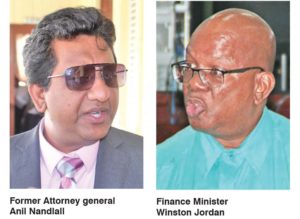Trouble is brewing over Government’s investing of the US$18 million signing bonus it received from ExxonMobil in overseas interest-bearing bonds.
Finance Minister Winston Jordan could be brought before the courts to face private criminal charges because of this action.
Former Attorney General, Opposition Parliamentarian Anil Nandlall, revealed that the institution of private criminal charges against Jordan for the handling of the bonus is being considered.
Nandlall slammed the decision to invest the monies in interest bearing securities, “knowing fully that there are legal proceedings challenging the constitutionality of placing the US$18 million signing bonus in a secret account in the Central Bank and outside of the Consolidated Fund as is mandated by Article 218 of the Constitution.”
“By so doing, the minister is not only demonstrating his crass disrespect for the judicial process, but is demonstrating even greater disregard for the Constitution by moving the money even farther away from the Consolidated Fund,” Nandlall declared.

Reminding that there is no entry for the money in the official accounting records of the Government for the years 2016 and 2017, Nandlall also pointed out that there is no mention of the money in the national budgets for the years 2017 and 2018.
“This money is public funds, and must be dealt with and accounted for in accordance with the Constitution and the laws of Guyana. However, Minister Jordan is treating this money as his personal funds, depositing it in which account he desires, transferring it to whichever country he wants, and determining what use will be made of the money, and when it will be deposited in the Consolidated Fund.” This must constitute misconduct in public office contrary to common law,” Nandlall continued.
“I am seriously considering instituting private criminal charges against Minister Jordan,” he warned.
Interest bearing securities
The bonus in question was paid to the Government’s Central Bank account by US oil giant ExxonMobil in 2016. The existence of this bonus and the renegotiated oil agreement with the company was kept an official secret until evidence of the transaction was leaked in December 2017.
The correspondence of September 20, 2016 which was leaked to the media was addressed to the Governor of the Bank of Guyana, with the subject being, “Signing bonus granted by ExxonMobil – Request to open bank account”.
It showed Finance Secretary at the Finance Ministry, Hector Butts, requesting that a foreign currency account be opened at the Bank in order to receive a deposit in the form of a ‘signing bonus’ to be given by the oil company.
The letter had stated, “This account should not be treated as part of the Bank’s reserves. Instead, the proceeds should be held in the currency of the deposit, that is, United States dollars, and invested in secured interest-bearing securities.”
At a press conference on Friday, Jordan, in providing an update on the money, said the sum was intact and had accrued US$36,169 in interest after being invested in matured US treasury bills and Canadian bonds.
“I have the latest statement from the Bank of Guyana, and it says that the account has a balance of US$18,036,169. All US$18 million is still in the account, plus the interest of course. During 2018, since we did not know when the United Nations Secretary-General would make his decision, we did not put any amounts in the budget,” he said.
But with Guyana taking its border controversy case against Venezuela before the International Court of Justice (ICJ), Jordan had explained the process the Government intends to use to get the money; US$15 million of which has been set aside for the case, while the remainder is for training and capacity building.
“So now, what we will have to do is go for supplementary. This supplementary will be based on Ministry of Foreign Affairs’ indication as to how much they think we will have to pay the lawyers and others who provide services related to the ICJ matter,” he explained.
“When finally it is passed by Parliament and signed into law by the President, we will then approach the Bank of Guyana to transfer the said identical sum to the Consolidated Fund,” he explained.



